It has been a year of Brexit battles these past 12 months, but it finally looks like the end is near and the United Kingdom will leave the EU, more than three and a half years after the historic referendum.
In keeping with the Christmas season, Breitbart London will break down the most significant Brexit news by the numbers, in the 12 months of Brexmas.
— One General Election —
On the first day of Brexitmas, the voters gave to me…
…an 80-seat Tor-y ma-jor-it-y!
After one referendum; a 2017 General Election where 91 per cent of seats were won by parties that pledged to respect the referendum result; a win for the Brexit Party in the European Parliament elections; and a 2019 General Election that delivered the “stonking” majority for the pro-Brexit Tories, it is safe to say to Remainers that, yes, the Brexit question is settled.
Even Remainer zealot Tony Blair was forced to admit that Britain will leave the EU, saying the “election settled the debate” on Brexit, and that “Now that Brexit will happen, we must make the best of it and the country must come together.”
Prime Minister Boris Johnson had called the election to clear out Parliament of Remainers so he could pass his Brexit legislation and deliver Brexit by the deadline on January 31st, 2020.
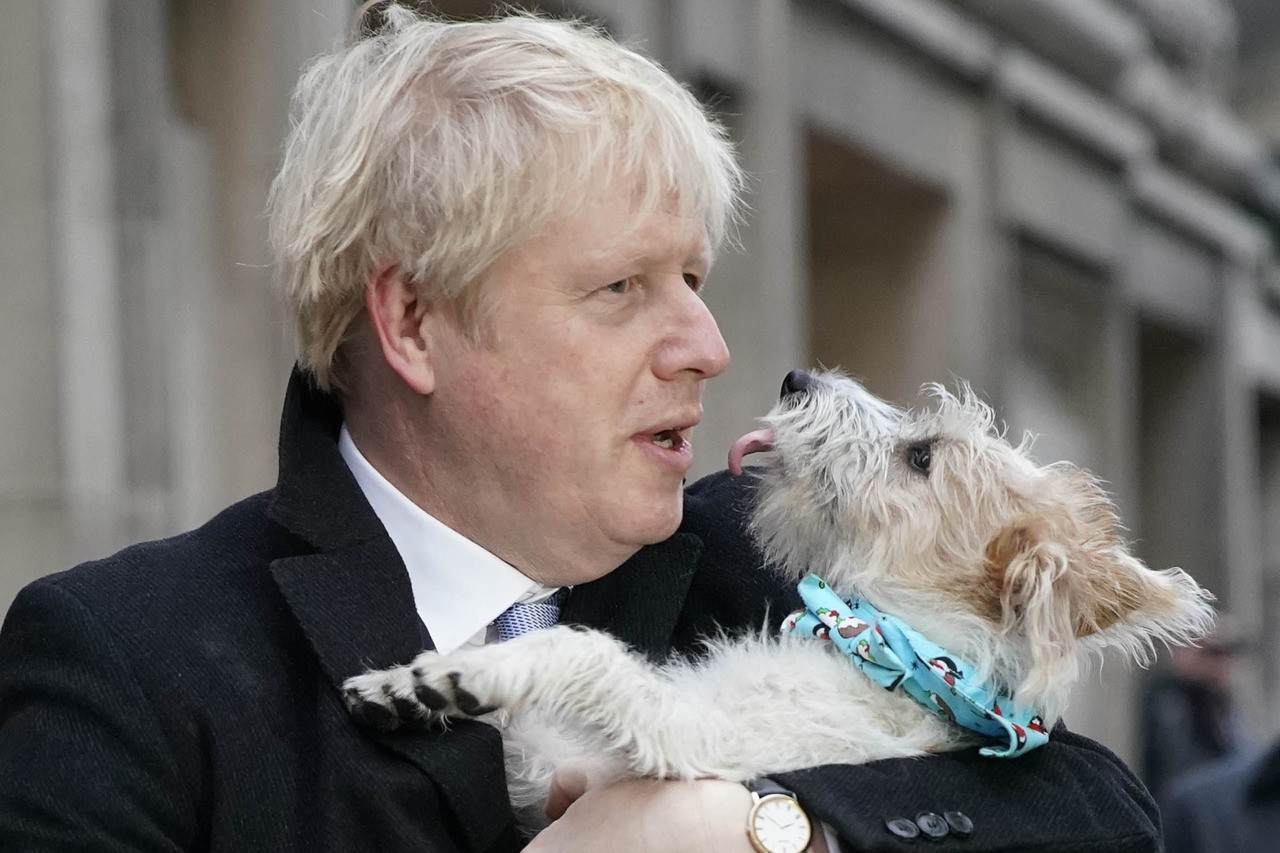
LONDON, UNITED KINGDOM – DECEMBER 12: Prime Minister Boris Johnson poses outside Methodist Hall polling station as he casts his vote with dog Dilyn, on December 12, 2019, in London, England. The current Conservative Prime Minister Boris Johnson called the first UK winter election for nearly a century in an attempt to gain a working majority to break the parliamentary deadlock over Brexit. The election results from across the country are being counted overnight and an overall result is expected in the early hours of Friday morning. (Photo by Christopher Furlong/Getty Images)
— Two Prime Ministers —
Remain-voter-turned-very-reluctant-Brexit-prime-minister Theresa May was the last candidate standing when appointed leader of the Conservative Party in 2016. After failing to pass her unpopular withdrawal agreement with the EU three times at the beginning of the year, delaying Brexit twice, and surviving a no-confidence vote, “Zombie May” finally resigned in June.
Boris Johnson, who once called May’s deal a “big turd” and helped lead the pro-Brexit Vote Leave campaign group in 2016, won the ballot to succeed her as party leader and prime minister in July.
— Three Brexit Delays —
The United Kingdom was meant to leave the EU on March 29th, 2019. However, after her deal had failed to pass in the House of Commons and her refusal to take Britain out of the EU in a clean “no deal” break, Theresa May delayed Brexit to April 12th. After her deal had been defeated three times, she extended to October 31st, 2020, giving Britain three Brexit deadlines in just one year.
After becoming prime minister in July, Boris Johnson promised to renegotiate a better deal with the EU and deliver Brexit “do or die”, with or without a deal, on October 31st. Johnson had struck a fresh deal and won a vote on it in Parliament on October 19th.
However, the Remainer-dominated House of Commons conspired to frustrate Brexit and stop the country leaving in a clean break by passing the so-called Benn Act, which forced Boris to request a third Brexit delay to January 31st, 2020, because the deal had not been fully passed in the Commons by the 19th.
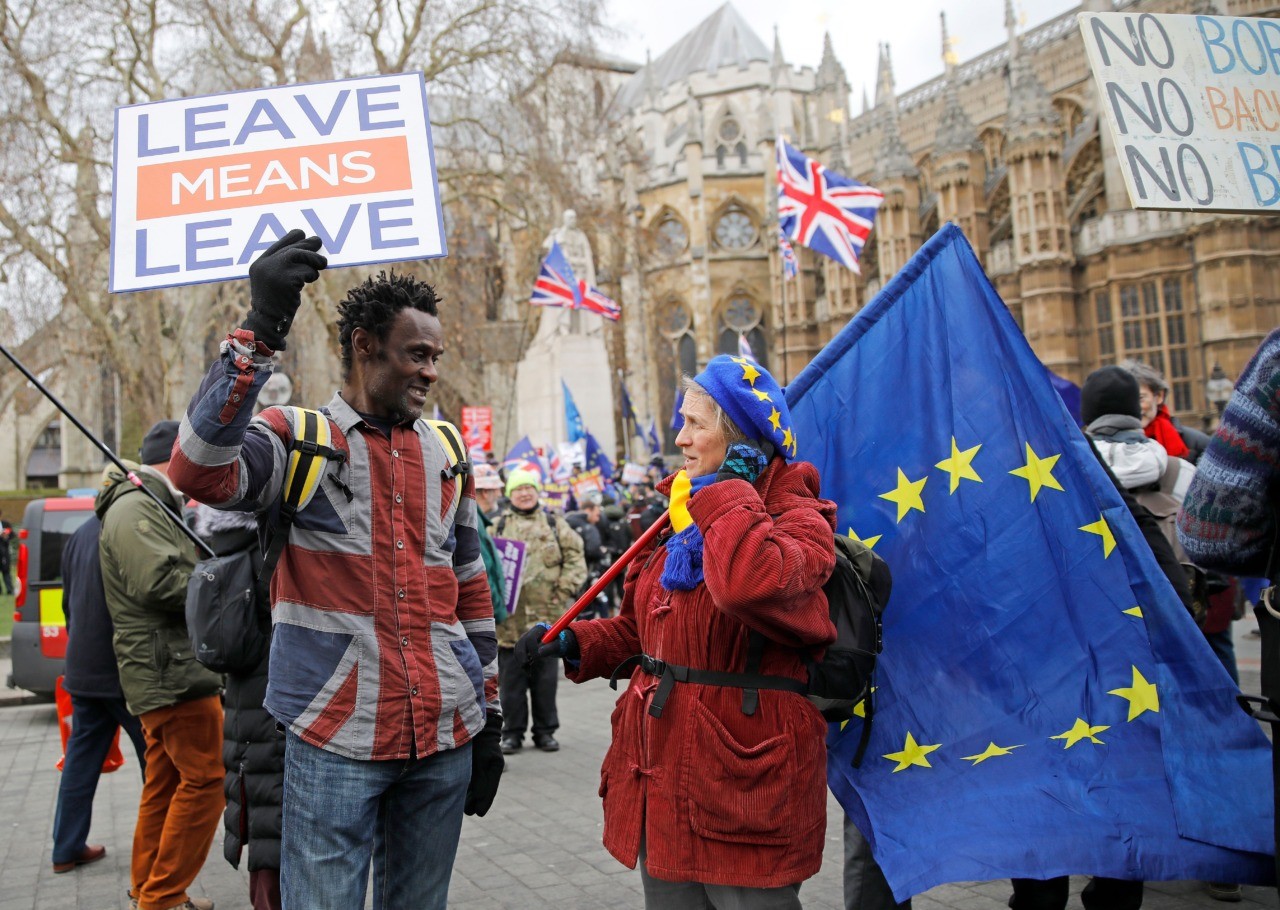
A pro-Brexit activist (L) holding a placard and wearing a union flag-themed shirt talks with an anti-Brexit demonstrator holding an EU flag as they protest near the Houses of Parliament in London on January 29, 2019. – British Prime Minister Theresa May will seek “legal changes” to the Brexit deal she agreed with EU leaders only last month to try to secure the support of MPs, her spokesman said Tuesday. (Photo by Tolga AKMEN / AFP) (Photo credit should read TOLGA AKMEN/AFP via Getty Images)
— Four Rebel Tories —
Dozens of Tory Remainer MPs rebelled against their government — with 21 punished with having with the party whip removed — but four committed particularly egregious offences against Brexit: Ken Clarke, Oliver Letwin, Dominic Grieves, and Philip Hammond.
Tory grandee and arch-Europhile Ken Clarke — who once said that he looked forward to the day “when the Westminster Parliament is just a Council Chamber in Europe” — offered to depose Johnson and become the interim prime minister to stop a clean, no-deal Brexit.
Sir Oliver Letwin was one of two architects of the Cooper-Letwin Bill (the other being Labour’s Yvette Cooper) which sought to force then-Prime Minister May to seek a Brexit extension and stop a clean-break Brexit. After it became law in early April, then-leader of the House of Commons and Brexiteer Andrea Leadsom accused Sir Oliver of committing “a coup, but using paper rather than guns”. Letwin was expelled from the Conservative Party in September, and lost his seat to the new Conservative candidate in the December snap election despite standing as an independent.
Brexiteer David Davis had accused Philip Hammond, former Chancellor of the Exchequer and right-hand man of Theresa May, of actively obstructing preparations for a clean-break Brexit while he was in Cabinet, saying in August: “[N]o-one else in government has done more to undermine that decision by the people [to leave the European Union] than the ex-Chancellor.”
Dominic Grieve had threatened to bring down the government if the prime minister brought the UK out of the EU in a no deal, and even compared Brexiteers to Islamic terrorists. An instrumental figure in backing anti-Brexit legislation, the former Attorney-General backed an amendment to make it harder to suspend parliament, thus giving the Remainer-dominated lower house more time to find ways to stop the United Kingdom from leaving the EU.
— Five Fruitless Brexit Deal Votes —
Theresa May’s “turd” deal was voted down three times in 2019: January 15th, March 12th, and March 29th.
Boris Johnson’s renegotiated deal was passed on first reading on October 19th and on second reading by October 22nd. However, the Remainer House of Commons voted down Johnson’s accelerated timetable to get all stages of the bill through Parliament by October 31st. Aware that the current parliament would continue to frustrate the will of the people, on the 28th Johnson called for an election on December 12th with MPs backing the move on the 29th.
On Friday, December 20th, Mr Johnson’s amended Brexit bill passed its first hurdle in the House of Commons and unlike the previous votes, this bill is expected to become law by the Brexit deadline.
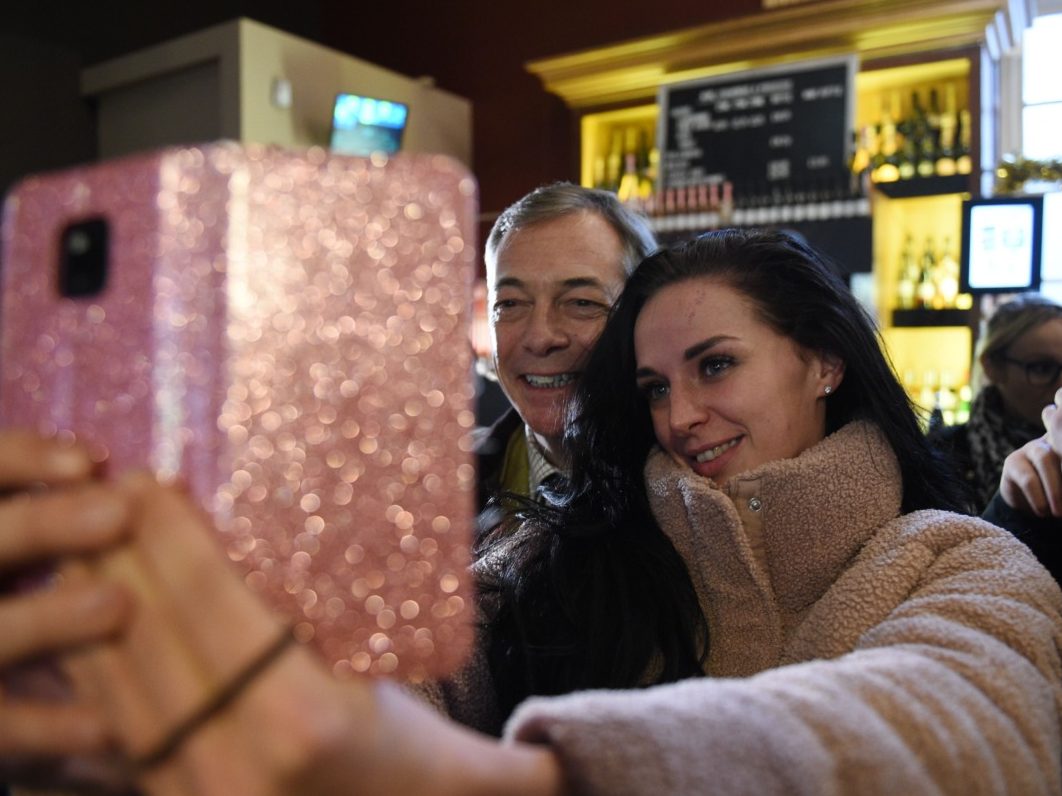
Brexit Party leader Nigel Farage (L) poses for a selfie during a general election campaign visit to Hull, northeast England on November 28, 2019. – Britain will go to the polls on December 12, 2019 to vote in a pre-Christmas general election. (Photo by Oli SCARFF / AFP) (Photo by OLI SCARFF/AFP via Getty Images)
— Six Weeks Till Brexit —
Technically.
The Bill passed its first hurdle in the House of Commons on December 20th, and will need to pass through other reading and committee stages both in the lower house and the House of Lords before becoming law. With the Conservatives having a strong working majority of 87, the law is set to be passed by the exit date of January 31st, 2020.
However, Britain will now move into the next stage of negotiating its relationship with the EU, as the withdrawal agreement “transition period” kicks in. During this time, Mr Johnson will try to negotiate a future trade deal with the EU, but the UK will still be subject to EU rules and institutions, including the Customs Union, the Single Market, and its associated Free Movement migration regime until almost 2021. Effectively still in the EU without any representation, the silver lining is that Johnson has enshrined in his Brexit bill that the transition period must end by December 2020 and cannot be extended.
— Seven Times Bercow Exposed His Anti-Brexit Bias —
It has long been known that former Speaker of the House of Commons John Bercow had an anti-Brexit bias. In January, he had allowed an amendment that attempted to derail Brexit despite being advised against it by Commons clerks, whose job it is to advise on matters of Parliamentary procedure. While in March, Bercow had accepted four anti-Brexit amendments and not a single pro-Brexit amendment, ignoring one a cross-party amendment that sought to stop a potential second referendum.
Despite expectations he would step down in the summer, Bercow announced in May that he would stay on as Speaker in what Leaver lawmakers interpreted as the Remainer hanging on to facilitate the disruption of the Brexit process.
In July, Bercow said that there is no “legal reason or constitutional reason why it [Brexit] shouldn’t be reversed by another referendum”, adding the following month that he would “fight with every breath” to stop the prime minister from suspending parliament.
After he finally stepped down as Speaker of the House of Commons in November, he cast off any pretence of neutrality and said that he thought the Brexit vote was “the biggest foreign policy mistake in the post-war period” — ahead of Suez, the Iraq War, and David Cameron’s interventions in Libya and Syria — and admitted that he “facilitated” stopping a clean-break Brexit.

Composite. LONDON, ENGLAND – OCTOBER 16: Gina Miller and John Bercow attend the PinkNews Awards 2019 at The Church House on October 16, 2019, in London, England. (Photo by Eamonn M. McCormack/Getty Images)
— Eight Court Challenges —
There were at least eight court challenges against Brexit this year, seven which took place in September.
Most relate to Prime Minister Boris Johnson proroguing (temporarily suspending) parliament in an effort to stop Remainers finding new ways to disrupt Brexit, the most high-profile legal decision being the Supreme Court ruling that the move was “unlawful”. Here’s a rundown of the most well-known cases and their outcomes:
1. September 4th. Court of Session, Scotland, ruled that it was not illegal for Prime Minister Johnson to prorogue parliament. The case was brought by a cross-party group of Remainer MPs led by Joanna Cherry of the Scottish National Party (SNP). Cherry sought to then appeal the decision in the Scottish court.
2. September 6th. Anti-Brexit campaigner Gina Miller lost a similar case in the High Court of England and Wales and decided to elevate her case to the UK’s Supreme Court in London.
3. September 11th. Ms Cherry won her appeal in the Scottish court, with the government announcing that it would appeal the decision in the Supreme Court.
4. September 12th. The High Court of Northern Ireland ruled that a no-deal, clean-break Brexit would not breach the Good Friday (Belfast) Agreement. The case was brought by campaigners representing victims of the Troubles. The group appealed the decision.
5. and 6. September 24th. The Supreme Court ruled against the Government in its appeal of the Scottish court’s decision and in a separate litigation in favour of Gina Miller, ruling that prorogation was unlawful, and sending the then-majority Remainer parliament back to work.
7. September 27th. The Court of Appeal in Belfast upheld the High Court of Northern Ireland’s decision that a no-deal Brexit would not disrupt peace in the country.
8. October 7th. Joanna Cherry and anti-Brexit lawyer Jolyon Maugham lost their case at the Scottish Court of Session to impose penalties on Boris Johnson if he refused to request a Brexit extension from the EU, possibly including jail time.
Keenly aware of unelected campaigners abusing the law to overturn the democratic process, Johnson’s team has reportedly “Gina Miller-proofed” his new Brexit bill.
— Nine Brexit Boosts —
It hasn’t all been tales of doom and gloom these past 12 months, with a number of stories revealing that, “despite Brexit”, the country hasn’t fallen into recession, millions have not lost their jobs, and it did not rain frogs and locusts.
Jobs was one area that continues to see the Project Fear doomsayers proven wrong. Just this month, the ONS revealed record-high employment, with unemployment at its lowest level since 1975. A report from April showed that nine in ten new British jobs since Brexit had gone to British workers — a change from the period before the vote when almost half were going to EU migrant workers.
With wider accessibility of British jobs for British workers has also seen an increase in wages this year, with both employment recruiter Reed and employment networking site LinkedIn admitting the pay raises were due a “talent shortage” post-Brexit, meaning employers have had to work harder to woo new employees.
The economy has also fared well, experiencing 13 quarters of growth since the Brexit vote. Investment also remains strong with reports revealing European investment had more than doubled since the Brexit vote and that London remains a global capital for investment.
British automotive giants Jaguar Land Rover and Aston Martin announced their pro-Britain, pro-Brexit, pro-business attitude when they pledged to keep investing and building in the UK this year.
Norway’s top wealth fund has put a 30-year bet on post-Brexit success, while several countries have promised bilateral trade deals with the UK including the United States, Australia, and Israel.
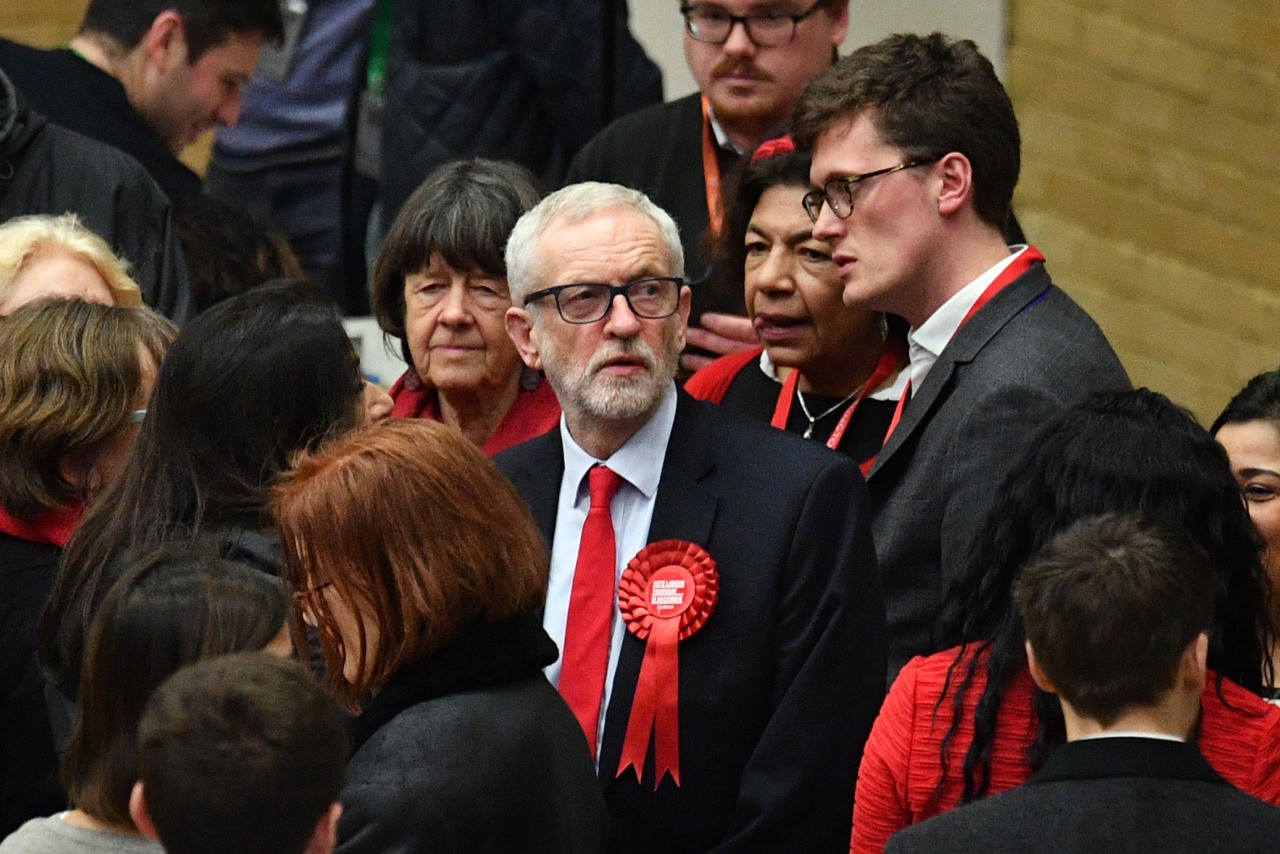
LONDON, ENGLAND – DECEMBER 12: Jeremy Corbyn, leader of the Labour Party, visits the vote count in his Islington North constituency on December 12, 2019 in London, England. Corbyn, who has held the Islington North seat since 1983, is expected to step down as leader if his party is dealt a decisive defeat by the Conservatives, led by Prime Minister Boris Johnson. The Prime Minister called the first UK winter election for nearly a century in an attempt to gain a working majority to break the parliamentary deadlock over Brexit. The election results from across the country are being counted overnight and an overall result is expected in the early hours of Friday morning. (Photo by Leon Neal/Getty Images)
— Ten Whips Restored —
Johnson drained the party swamp in September when he removed the whip from 21 rebel MPs for voting against the government on Brexit, barring them from running for the Conservatives in the election. The MPs had voted in favour of a plan to stop a clean-break Brexit. He eventually restored the whip to ten of those lawmakers — although several did not stand for election again in the December snap election regardless.
The Conservatives will likely take party discipline very seriously in the coming years, even after the clearout of Remainer hardliners, as Johnson moves his Brexit plans through the Commons.
— Eleven TIGgers —
The Remain Alliance thought that it had a movement on its hands when eight Labour and three Conservative MPs defected and formed The Independent Group (TIG), with party leader Heidi Allen referring to her new group of MPs as “TIGgers”. Later rebranded as Change UK (CUK), and again as The Independent Group For Change, with the Remainers hoped that they would lead an anti-Brexit “centrist” revolution in British politics and stop the United Kingdom from leaving the EU.
However, after failing to win a single seat in the European Parliament elections, losing more than half of their MPs to the Liberal Democrats, and all those Commons lawmakers who had ever been associated with the party losing the 2019 General Election, the party quietly disbanded in December 2019, just ten months after its inception.
— Twelve: A very Brexit Christmas —
Okay, this one is a bit of cheat, but after 12 months of anti-Brexit plotting and machinations, it’s important to put one chorus of this song aside to sit back and breath a sigh of relief — until 2020, when Remainers will likely try to find new ways to stop the UK leaving the EU.
What better Christmas could a Brexiteer ask for than a prime minister with a “stonking” majority who has promised to deliver Brexit? Yes, politicians had made promises regarding Brexit before and have let the country down bitterly. But let us be forgiven, at this joyful time of year, if we wish to be optimistic — if not for a few more weeks — and look forward to a brighter, freer, Britain.
Standing outside of Number 10, with a Christmas tree in the background, Prime Minister Boris Johnson sought on Friday the 13th of December to strike a balance between victory and reconciliation, saying that now was the time for the country to embrace the adventure ahead of it, and for those opposed to Brexit to move on. He said:
“[A]fter five weeks, frankly, of electioneering, this country deserves a break from wrangling, a break from politics, and a permanent break from talking about Brexit…
“I want everyone to go about their Christmas preparations happy and secure in the knowledge that here in this people’s government the work is now being stepped up to make 2020 a year of prosperity and growth and hope, and to deliver a parliament that works for the people.”
“Thank you all very much, and Happy Christmas.”
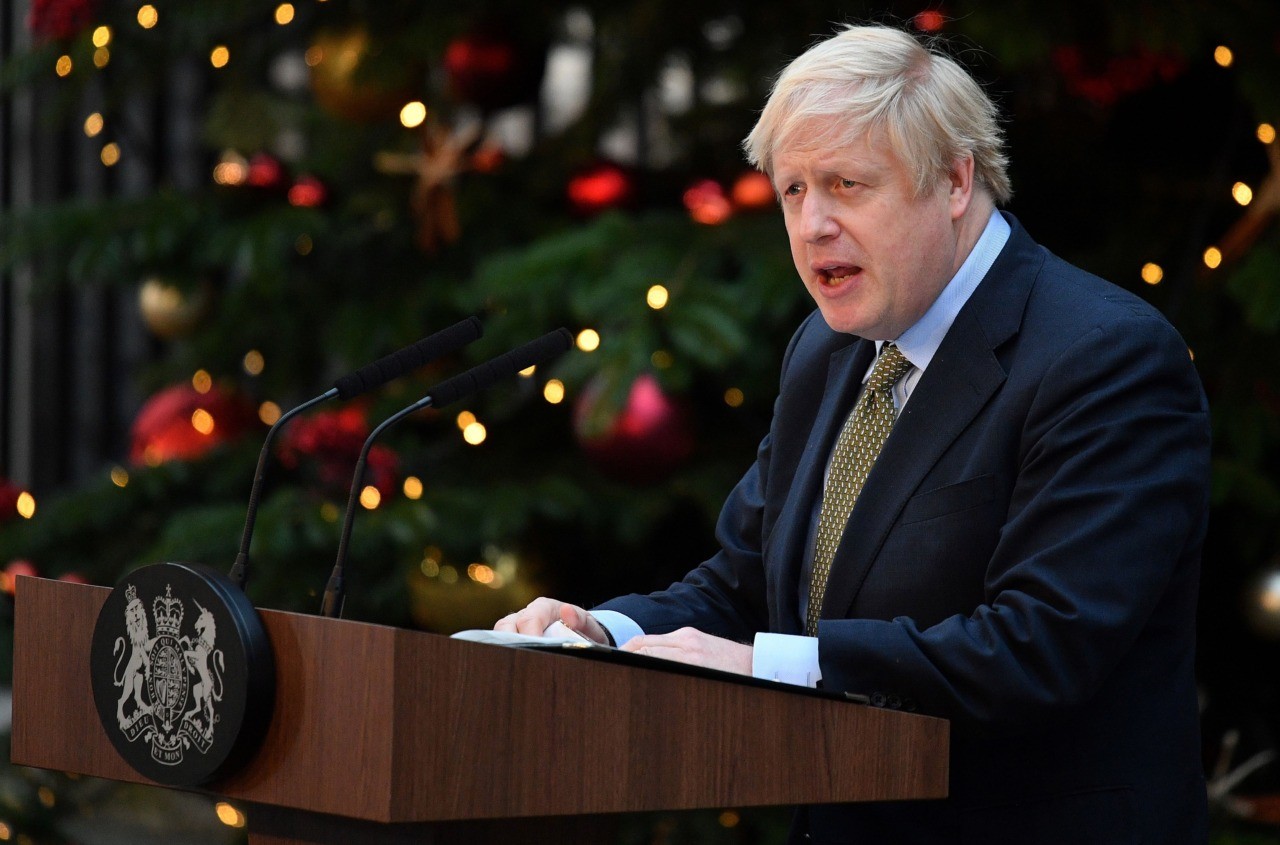
Britain’s Prime Minister Boris Johnson delivers a speech outside 10 Downing Street in central London on December 13, 2019, following his Conservative party’s general election victory. – UK Prime Minister Boris Johnson proclaimed a political “earthquake” Friday after his thumping election victory cleared Britain’s way to finally leave the European Union after years of damaging deadlock over Brexit. (Photo by DANIEL LEAL-OLIVAS/AFP via Getty Images)
via Breitbart News
Enjoy this article? Read the full version at the authors website: https://www.breitbart.com
